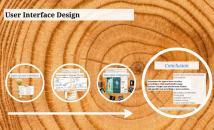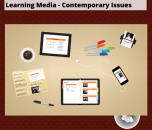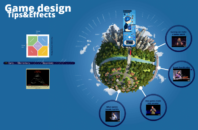Chapters
Definitions
Numerous games have narrative elements which give a context to an event in a game, make the activity of playing it less abstract and enhance its entertainment value, although narrative elements are not always clearly present or present at all.
A game is structured playing, usually undertaken for enjoyment and sometimes used as an educational tool. Key components of games are goals that can be attained used in embedded tools, that function according to defined rules, requiring skill, strategy, luck, to tackle built in challenges, while events change dynamically according to interactions. Games generally involve mental or physical stimulation – often both – and can have positive and negative effects (site).
Game classification is the classification of games, forming a game taxonomy. Many different methods of classifying games exist.
A video game is an electronic game that involves human interaction with a user interface to generate visual feedback on a video device. Many games help develop practical skills, serve as a form of exercise, or otherwise perform an educational, simulational, or psychological role.
Simulation is the imitation of the operation of a real-world process or system over time. The act of simulating something first requires that a model be developed; this model represents the key characteristics or behaviours/functions of the selected physical or abstract system or process. The model represents the system itself, whereas the simulation represents the operation of the system over time.
A simulation game attempts to copy various activities in “real life” in the form of a game for various purposes: training, analysis, or prediction. Usually there are no strictly defined goals in the game, just running around, playing as a character, like in war games, business games, and role play simulation.
An instructional simulation, is a simulation of some type of reality (system or environment) but which also includes instructional elements that help a learner explore, navigate or obtain more information about that system or environment that cannot generally be acquired from mere experimentation. Instructional simulations are typically goal oriented and focus learners on specific facts, concepts, or applications of the system or environment.
Education in its general sense is a form of learning in which the knowledge, skills, and habits of a group of people are transferred from one generation to the next through teaching, training, or research. Education frequently takes place under the guidance of others, but may also be autodidactic. Any experience that has a formative effect on the way one thinks, feels, or acts may be considered educational.
Edutainment (education + entertainment) is any entertainment content that is designed to educate as well as to entertain. Content with a high degree of both educational and entertainment value is known as edutainment. There also exists content that is primarily educational but has incidental entertainment value. Finally, there is content that is mostly entertaining but can be seen to have some educational value.
A serious game is a game designed for a primary purpose other than pure entertainment. The “serious” adjective is generally prepended to refer to products used by industries like defence, education, scientific exploration, health care, emergency management, city planning, engineering, religion, and politics. It is difficult to maintain a balance between fun, game mechanics and learning (PDF).
Gamification is the use of game thinking and game mechanics in a non-game context to engage users and solve problems. Gamification is used in applications and processes to improve user engagement, Return on Investment, data quality, timeliness, and learning (PDF) e.g. World of Classcraft.
An alternate reality game (ARG) is an interactive networked narrative that uses the real world as a platform and uses transmedia storytelling to deliver a story that may be altered by participants’ ideas or actions.
The form is defined by intense player involvement with a story that takes place in real-time and evolves according to participants’ responses. Subsequently, it is shaped by characters that are actively controlled by the game’s designers, as opposed to being controlled by artificial intelligence as in a computer or console video game. Players interact directly with characters in the game, solve plot-based challenges and puzzles, and collaborate as a community to analyze the story and coordinate real-life and online activities. ARGs generally use multimedia, such as telephones, email and mail but rely on the Internet as the central binding medium.
References: Definitions and links (unless otherwise indicated as “site” or “pdf”) are copied and edited from English Language Wikipedia as of 1st September 2013. Titles could be further explored through indicated links.
Research
Design issues
Case-studies
T@T lab case-studies:
![]() Robots Sort – Unity
Robots Sort – Unity
![]() Augmented Expressions – ICT Tools for Early Ages – Prezi
Augmented Expressions – ICT Tools for Early Ages – Prezi
![]() Turcsanyi-Szabo, M. (2006). Creative Classroom CD Logotron Ltd, Cambridge
Turcsanyi-Szabo, M. (2006). Creative Classroom CD Logotron Ltd, Cambridge
- Turcsanyi-Szabo, M. (2000). Subject Oriented Microworld Extendable environment for learning and tailoring educational tools − a scope for teacher training, Proceedings of 16th IFIP World Computer Congress, pp. 387-394, ICEUT 2000, Beijing, China.
- Réthely-Prikkel, B., Turcsanyi-Szabo, M. (2003). Team Challenge, Proceedings of Eurologo 2003, pp. 281 – 290, Porto, Portugal – also published at
- Turcsanyi-Szabo, M., Bedo, A., Pluhar, Zs. (2006). Case study of a TeaM Challenge game – e-PBL revisited, ed. Watson, D. Education and Information Technologies, No.4 October 2006. pp. 341-355, Springer http://www.springerlink.com/content/t4896677504820u2/
Games
Health games
Science games
Math games organized by grades and curriculum
Research center database of games
Games for health, education, military, corporation, social good
Educational games reviews
Jeremiah McCall’s website on history and current events games
Games 4 Learning institute game database
Polished serious games of all sorts
University of Wisconsin database on health games
Institute of Play games database
Learning Games Network database
History games database
Educational Games:
Wondermind
Serious games directory
Game based learning and gamification resources
40 sites for educational games












